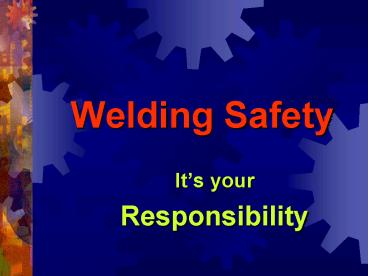Welding Safety - PowerPoint PPT Presentation
1 / 29
Title:
Welding Safety
Description:
Leather gauntlet type. Jacket. Leather. Fire resistant cotton. Welding Sleeves. Leather. Fire resistant cotton. Jewelry. Not to be worn! Material Safety Data Sheet ... – PowerPoint PPT presentation
Number of Views:315
Avg rating:3.0/5.0
Title: Welding Safety
1
Welding Safety
- Its your
- Responsibility
2
Good Safety Habits
- Protect from
- Personal Injury
- Injury to others around you
- Damage to the Equipment
- Damage to the Work Piece
3
Is Anyone Really Accident Prone?
- NO!
- They are just careless or indifferent to Safety
Rules
4
What are some of the main causes of accidents?
- Horseplay
- Carelessness
- Indifference to Safety Rules
5
Why should all accidents be reported immediately?
- Even a small scratch can become infected and lead
to a more serious injury - Workmens Compensation Report must be filed
within 24hrs of accident
6
How is it possible to become involved in an
accident while playing around in the shop?
- Any form of horseplay is dangerous and can lead
to a serious or fatal injury.
7
What might happen if you attempt to use any
equipment without proper instruction?
- Personal Injury
- Injury to Others
- Damage to Equipment
- Damage to Work Piece
8
What should be done if some malfunction occurs
during a welding operation?
- Report the Malfunction to the Instructor or
Foreman Immediately!
9
Ventilation
- What practice should be followed regarding
ventilation during any welding operation?
- All welding should be done in a well ventilated
area
10
Ventilation
- Natural Ventilation
- Plenty of fresh air in the welding area.
- Outside
- Large Shop
- Forced Ventilation
- Using a mechanical device to move the air.
- Fan
- Ventilation System
11
Improper Ventilation
- Could lead to
- Sickness
- Colds, upper respiratory infections, or even
pneumonia - Disease
- Lung diseases
- Emphysema
- Lung Cancer
- Death
- Suffocation
12
Why should strict attention be given to proper
clothing and eye protection?
- They provide protection from heat, fire, sparks,
flying debris and harmful light rays.
13
Why should used containers be cleaned thoroughly
before any welding or cutting is done on them?
- They may contain combustible substances that
could produce harmful fumes or an explosion.
14
Why do fires often occur during a cutting
operation?
- Proper precautions were not taken prior to the
cutting operation.
15
What are some of the precautions that should be
taken during a cutting operation?
- Check the area for flammable materials, like
gasoline, paint, or paper - If the cutting is over a wooden floor or a grassy
area be sure to flood the area with water prior
to starting the cutting torch. - Make sure there is a fire extinguisher available.
- Never use oxygen to dust off your clothing.
- Where risk is great, always have a fire watch
with a fire extinguisher close by.
16
Why is it dangerous for acetylene to come in
contact with high alloyed copper piping?
- When acetylene comes into contact with high
alloyed copper piping, acetylide is produced
which is highly explosive.
17
What is the significance of having each welding
booth equipped with a power disconnect?
- Incase of an emergency or a malfunction the power
can be shut down quickly.
18
Why should a welding machine never be overloaded?
- Overloading the machine can cause overheating and
damage the welding machine. This may also cause
damage to the transformer.
19
Why should the range and polarity switch never be
operated when the machine is under a load?
- Switching the current while the machine is under
a load will cause an arc between the contacts and
weld the contacts together.
Range Polarity
20
Matches and Cigarette Lighters
- Cigarette lighters will leak gas into your pocket
causing an explosion that could be fatal! - Sparks can ignite matches in your pocket causing
a serious burn!
21
Ultraviolet Light
- Most Dangerous Light
- Causes Flash Burns to the eyes in seconds
- Cant see it or feel it
22
Infrared Light
- Can be Felt as Heat
23
Eye Protection
- Safety Glasses
- Cutting Glasses
- Welding Helmet
24
Eye Burns
- Flash burns can happen in seconds.
- Ultraviolet light is the main cause of eye burns.
- See a doctor immediately. The eye is in a warm
moist environment and bacteria can grow rapidly.
25
Ear Protection
- Two Types
- Ear Plugs
- Ear Muffs
- Provide Protection from loud noises and trash
26
Clothing
- Hats
- 100 cotton or wool
- Long Sleeve Shirt
- 100 cotton or wool
- Shoes
- Leather, no tongue
- Pants
- 100 cotton or wool
- No Shorts!
- Gloves
- Leather gauntlet type
- Jacket
- Leather
- Fire resistant cotton
- Welding Sleeves
- Leather
- Fire resistant cotton
- Jewelry
- Not to be worn!
27
Material Safety Data Sheet
- A list of the hazardous materials in a product
being used, like a welding rod. - Helps us identify the proper PPE and ventilation
that should be used during a welding process. - Can also be used if you are involved in an
accident with chemicals so doctors will know how
to treat your injury.
28
Fire Extinguishers
- TYPE A
- Used on a wood, paper or trash fire
- TYPE B
- Used on a fire that contained gasoline, paint or
other flammable liquid.
- TYPE C
- Used on an electrical fire involving a breaker
panel, welding machine or electric motor. - TYPE D
- Is used on a fire that contains Magnesium or zinc
29
- The End
- Welding Safety
- Metals Technology































